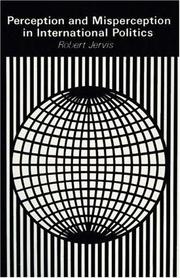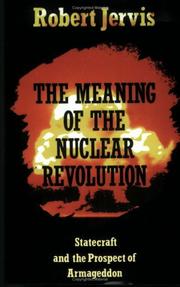| Listing 1 - 10 of 67 | << page >> |
Sort by
|
Book
Abstract | Keywords | Export | Availability | Bookmark
 Loading...
Loading...Choose an application
- Reference Manager
- EndNote
- RefWorks (Direct export to RefWorks)
Book
ISBN: 0801457610 0801458854 0801478065 9780801458859 9780801447853 0801447852 9780801457616 9780801478062 1336284080 Year: 2010 Volume: *21 Publisher: Itaca (N.Y.): Cornell university press,
Abstract | Keywords | Export | Availability | Bookmark
 Loading...
Loading...Choose an application
- Reference Manager
- EndNote
- RefWorks (Direct export to RefWorks)
The U.S. government spends enormous resources each year on the gathering and analysis of intelligence, yet the history of American foreign policy is littered with missteps and misunderstandings that have resulted from intelligence failures. In Why Intelligence Fails, Robert Jervis examines the politics and psychology of two of the more spectacular intelligence failures in recent memory: the mistaken belief that the regime of the Shah in Iran was secure and stable in 1978, and the claim that Iraq had active WMD programs in 2002. The Iran case is based on a recently declassified report Jervis was commissioned to undertake by CIA thirty years ago and includes memoranda written by CIA officials in response to Jervis's findings. The Iraq case, also grounded in a review of the intelligence community's performance, is based on close readings of both classified and declassified documents, though Jervis's conclusions are entirely supported by evidence that has been declassified. In both cases, Jervis finds not only that intelligence was badly flawed but also that later explanations-analysts were bowing to political pressure and telling the White House what it wanted to hear or were willfully blind-were also incorrect. Proponents of these explanations claimed that initial errors were compounded by groupthink, lack of coordination within the government, and failure to share information. Policy prescriptions, including the recent establishment of a Director of National Intelligence, were supposed to remedy the situation. In Jervis's estimation, neither the explanations nor the prescriptions are adequate. The inferences that intelligence drew were actually quite plausible given the information available. Errors arose, he concludes, from insufficient attention to the ways in which information should be gathered and interpreted, a lack of self-awareness about the factors that led to the judgments, and an organizational culture that failed to probe for weaknesses and explore alternatives. Evaluating the inherent tensions between the methods and aims of intelligence personnel and policymakers from a unique insider's perspective, Jervis forcefully criticizes recent proposals for improving the performance of the intelligence community and discusses ways in which future analysis can be improved.
Intelligence service --- Iraq War, 2003-2011 --- Weapons of mass destruction --- Evaluation --- Military intelligence --- Evaluation. --- United States. --- Iran --- History --- Anglo-American Invasion of Iraq, 2003-2011 --- Dawn, Operation New, 2010-2011 --- Gulf War II, 2003-2011 --- Iraqi Freedom, Operation, 2003-2010 --- New Dawn, Operation, 2010-2011 --- Operation Iraqi Freedom, 2003-2010 --- Operation New Dawn, 2010-2011 --- Operation Telic, 2003-2011 --- Persian Gulf War, 2003-2011 --- Telic, Operation, 2003-2011 --- Counter intelligence --- Counterespionage --- Counterintelligence --- Intelligence community --- Secret police (Intelligence service) --- Agjencia Qendrore e Inteligjencës --- Central Intelligence Agency (U.S.) --- CIA (Central Intelligence Agency (U.S.)) --- CIP (United States. Centrālās izlūkošanas pārvalde) --- Mei-kuo chung yang chʻing pao chü --- National Security Council (U.S.). --- Si Aing Ei --- T︠S︡entralʹnoe razvedyvatelʹnoe upravlenie SShA --- T︠S︡RU SShA --- T︠S︡RU (T︠S︡entralʹnoe razvedyvatelʹnoe upravlenie SShA) --- ЦРУ США --- ЦРУ (Центральное разведывательное управление США) --- Центральное разведывательное управление США --- ארצות הברית. --- 美國. --- War on Terrorism, 2001-2009 --- Public administration --- Research --- Disinformation --- Secret service --- National Security Council (U.S.) --- CIA (Central Intelligence Agency) --- Polemology --- United States --- Case studies --- United States. Central Intelligence Agency --- Revolution, 1979 --- Iraq --- Intelligence service - United States - Evaluation - Case studies --- Iraq War, 2003-2011 - Military intelligence - United States - Evaluation --- Weapons of mass destruction - Iraq --- Iran - History - Revolution, 1979 --- United States of America

ISBN: 0691100497 0691056560 9780691056562 9780691100494 1400873134 Year: 1976 Publisher: Princeton (N.J.): Princeton university press,
Abstract | Keywords | Export | Availability | Bookmark
 Loading...
Loading...Choose an application
- Reference Manager
- EndNote
- RefWorks (Direct export to RefWorks)
International relations. Foreign policy --- International relations --- Relations internationales --- Research. --- Recherche --- Research --- 327 --- -#SBIB:327.1H10 --- Coexistence --- Foreign affairs --- Foreign policy --- Foreign relations --- Global governance --- Interdependence of nations --- International affairs --- Peaceful coexistence --- World order --- National security --- Sovereignty --- World politics --- Buitenlandse betrekkingen. Buitenlandse politiek. Internationale betrekkingen. Internationale politiek. Wereldpolitiek --- Internationale betrekkingen: theorieën --- Law, Politics & Government --- International Relations --- 327 Buitenlandse betrekkingen. Buitenlandse politiek. Internationale betrekkingen. Internationale politiek. Wereldpolitiek --- #SBIB:327.1H10 --- International relations - Research --- VIE INTERNATIONALE --- FACTEURS PSYCHOLOGIQUES --- COOPERATION

ISBN: 0415951003 0415951011 9780415951012 9780415951005 Year: 2005 Publisher: New York: Routledge,
Abstract | Keywords | Export | Availability | Bookmark
 Loading...
Loading...Choose an application
- Reference Manager
- EndNote
- RefWorks (Direct export to RefWorks)
War on Terrorism, 2001-2009 --- Deterrence (Strategy) --- War --- World politics --- International relations --- Security, International --- Balance of power --- Bush, George Walker, --- Political and social views --- United States --- Foreign relations --- World politics - 21st century --- Bush, George Walker, - 1946- - Political and social views --- United States - Foreign relations - 2001 --- -War on Terrorism, 2001-2009 --- Bush, George Walker, - 1946 --- -United States

ISBN: 0231069332 Year: 1989 Publisher: New York (N.Y.) Colombia University Press
Abstract | Keywords | Export | Availability | Bookmark
 Loading...
Loading...Choose an application
- Reference Manager
- EndNote
- RefWorks (Direct export to RefWorks)

ISBN: 0691005303 0691026246 1400812208 9786612753329 1282753320 1400822408 1400804086 9781400804085 9781400812202 9781282753327 9781400822409 Year: 1997 Publisher: Princeton, N.J. : Princeton University Press,
Abstract | Keywords | Export | Availability | Bookmark
 Loading...
Loading...Choose an application
- Reference Manager
- EndNote
- RefWorks (Direct export to RefWorks)
Based on more than three decades of observation, Robert Jervis concludes in this provocative book that the very foundations of many social science theories--especially those in political science--are faulty. Taking insights from complexity theory as his point of departure, the author observes that we live in a world where things are interconnected, where unintended consequences of our actions are unavoidable and unpredictable, and where the total effect of behavior is not equal to the sum of individual actions. Jervis draws on a wide range of human endeavors to illustrate the nature of these system effects. He shows how increasing airport security might actually cost lives, not save them, and how removing dead trees (ostensibly to give living trees more room) may damage the health of an entire forest. Similarly, he highlights the interconnectedness of the political world as he describes how the Cold War played out and as he narrates the series of events--with their unintended consequences--that escalated into World War I. The ramifications of developing a rigorous understanding of politics are immense, as Jervis demonstrates in his critique of current systemic theories of international politics--especially the influential work done by Kenneth Waltz. Jervis goes on to examine various types of negative and positive feedback, bargaining in different types of relationships, and the polarizing effects of alignments to begin building a foundation for a more realistic, more nuanced, theory of international politics. System Effects concludes by examining what it means to act in a system. It shows how political actors might modify their behavior in anticipation of system effects, and it explores how systemic theories of political behavior might account for the role of anticipation and strategy in political action. This work introduces powerful new concepts that will reward not only international relations theorists, but also all social scientists with interests in comparative politics and political theory.
Book
ISBN: 0801493447 0801417155 Year: 1985 Publisher: Ithaca, N.Y. Cornell University Press
Abstract | Keywords | Export | Availability | Bookmark
 Loading...
Loading...Choose an application
- Reference Manager
- EndNote
- RefWorks (Direct export to RefWorks)

ISBN: 0801495652 080142304X Year: 2010 Publisher: Ithaca, N.Y. Cornell University Press
Abstract | Keywords | Export | Availability | Bookmark
 Loading...
Loading...Choose an application
- Reference Manager
- EndNote
- RefWorks (Direct export to RefWorks)
830 Economie --- 855.1 Strategie --- 872 Massavernietigingswapens --- 876 Veiligheidspolitiek --- Polemology --- Nuclear warfare --- World politics --- Coexistence (World politics) --- Peaceful coexistence --- Atomic warfare --- CBR warfare --- Nuclear strategy --- Nuclear war --- Thermonuclear warfare --- War --- Nuclear crisis control --- Nuclear weapons

ISBN: 020395629X 1283964473 1135425167 9781135425166 9780203956298 0415951003 9780415951005 0415951011 9780415951012 9781135425234 9781135425302 113542523X Year: 2005 Publisher: New York : Routledge,
Abstract | Keywords | Export | Availability | Bookmark
 Loading...
Loading...Choose an application
- Reference Manager
- EndNote
- RefWorks (Direct export to RefWorks)
To say that the world changed drastically on 9/11 has become a truism and even a cliché. But the incontestable fact is that a new era for both the world and US foreign policy began on that infamous day and the ramifications for international politics have been monumental.In this book, one of the leading thinkers in international relations, Robert Jervis, provides us with several snapshots of world politics over the past few years. Jervis brings his acute analysis of international politics to bear on several recent developments that have transformed international politics and American f
War on Terrorism, 2001-2009. --- Deterrence (Strategy) --- War. --- World politics --- International relations. --- Security, International. --- Balance of power. --- Armed conflict (War) --- Conflict, Armed (War) --- Fighting --- Hostilities --- Wars --- International relations --- Military art and science --- Peace --- Military policy --- Psychology, Military --- Strategy --- First strike (Nuclear strategy) --- Nuclear crisis stability --- Global Struggle Against Violent Extremism, 2001-2009 --- Global War on Terror, 2001-2009 --- GWOT, 2001-2009 (War on Terrorism) --- Terror War, 2001-2009 --- Terrorism War, 2001-2009 --- War against Terrorism, 2001-2009 --- War on Terror, 2001-2009 --- Military history, Modern --- Terrorism --- Afghan War, 2001 --- -Iraq War, 2003-2011 --- Operation Enduring Freedom, 2001 --- -Power, Balance of --- Power politics --- Political realism --- Collective security --- International security --- Disarmament --- International organization --- Coexistence --- Foreign affairs --- Foreign policy --- Foreign relations --- Global governance --- Interdependence of nations --- International affairs --- Peaceful coexistence --- World order --- National security --- Sovereignty --- Prevention --- Bush, George W. --- Bush, George, --- Bush, Geo, --- Bush, Dzhordzh Uoker, --- Bush, Dzh. U. --- Bush, Dzh. --- Bush, --- Bushi, Qiaozhi W., --- Bush, Zhorzh, --- Arbusto, Jorge W., --- Bush, Xhorxh W., --- Political and social views. --- United States --- Afghan War, 2001-2021 --- Iraq War, 2003-2011 --- Power, Balance of --- -Prevention
Book
Year: 1978 Publisher: Urbana-Champaign: Department of political science. University of Illinois,
Abstract | Keywords | Export | Availability | Bookmark
 Loading...
Loading...Choose an application
- Reference Manager
- EndNote
- RefWorks (Direct export to RefWorks)
| Listing 1 - 10 of 67 | << page >> |
Sort by
|

 Search
Search Feedback
Feedback About UniCat
About UniCat  Help
Help News
News